By Uran Kalakulla
Part Twenty-Nine
Nazism and Communism
Memorie.al / Nazism lasted 12 years, while Stalinism lasted twice as long. In addition to many common characteristics, there are many differences between them. The hypocrisy and demagogy of Stalinism was of a more subtle nature, which was not based on a program that was openly barbaric, like Hitler’s, but on a socialist, progressive, scientific and popular ideology, in the eyes of the workers; an ideology that was like a convenient and comfortable curtain to lie to the working class, to lull the sharpness of intellectuals and rivals in the struggle for power.
One of the consequences of this peculiarity of Stalinism is that the entire Soviet people, its best, capable, hardworking and honest representatives, suffered the most terrible blow. At least 10-15 million Soviets lost their lives in the torture chambers of the KGB, martyred or executed, as well as in the gulag camps and others like them, camps where it was forbidden to correspond (in fact, they were prototypes of the Nazi death camps); in the mines in the ice of Norilsk and Vorkuta, where people died from cold, hunger, from crushing work in countless construction sites, in the exploitation of forests, in the opening of canals and during transportation in leaded wagons, or in the flooded barns of the death ships.
Continued from the previous issue
Velko Stepanovich and others
Velko was a large man, with a handsome face, blue eyes, but a beard of hair and beard. This is a rare contrast in people, which not only does not look bad, but on the contrary shows a harmonious uniqueness. His appearance itself was attractive in itself, in addition to his gentle, reserved and serious nature, his dignified, slightly withdrawn attitude and his slow and measured speech. For these reasons, almost everyone approached Velko with pleasure and enjoyed his company. And he did not refuse anyone, but it seemed that everyone knew how to give a certain and measured dose of approach to everyone.
I also happened to get to know him and, in a short time, we became quite close friends. After the hours of forced work, in the small square in front of the canteen, we often walked up and down, talking about the things that were most dear to both of us. What attracted me to him as a person were the honesty, seriousness and graceful behavior of a cultured person, as well as the sincerity like spring water. In him, I never noticed pretense, ridiculous boasting, arrogance or the shadow of any vice.
Virtue seemed to have taken firm root in his conscience. But, with all these positive sides, what pushed me even more strongly to approach him, in a true friendship, which was based on both trust and mutual respect, was compassion for his great misfortunes, which had befallen him and for the sake of which he had been in prison for many years.
Although completely different from me, he had ended up there completely innocent. And his real life was worthy of a novel, with very painful content. As a Montenegrin, he was from the heart of his country, from Kolasin, this highland, where poverty has had its lair in the entire region, for a long time. Thus, Velkoja had spent a rather sad childhood: drowned in poverty.
When the war against the Nazi-fascist occupiers began in Yugoslavia, Velkoja, still a teenager, helped as a partisan or partisan courier. After the war, after finishing high school in his country, he went to study at the university in Belgrade, at the Faculty of Philosophy. It was 1948, when Tito’s break with Stalin took place.
But Velko, disappointed by Tito, thought that Stalin was right and left the faculty went back to his homeland, where he took the girl of his heart and with her crossed the border and entered Hoxha’s Albania, with the intention of going from there to the Soviet Union. But the Albanian government of the time took him into exile, to a village in Lushnja, where he found many other Yugoslavs, who had also come with Velko’s illusions.
In that camp, the emigrants were kept in silos as in a prison camp and taken out to forced labor in canals and agriculture. This revolted them and, among them, Velko stood up to protest, submitting his request to go to the Soviet Union for studies and anti-Titoist activities. But the head of the anti-Titoist Yugoslav emigration, a former Yugoslav aviation commander (I don’t remember his name), accompanied by a representative of the Central Committee of the Albanian People’s Party, told Velko that Albania was the most suitable place for diversion against Titoist Yugoslavia, and even persuaded him and promised that they would take him for higher studies, at one of our universities.
And, in fact, they took him to the faculty, to the Russian branch at the State University of Tirana. During four years of university studies, Velko lived in a simple hotel room, together with his Montenegrin wife, where a son was born. And all this, with only 3,000 old ALL scholarship. When he received his diploma, he was appointed to a high school in Elbasan, where, in addition to day students, there were also night students, along with some officers.
As a kind and loving man, Velko, who had also learned Albanian fluently, befriended his adult students. Khrushchev agreed with Tito and the task of returning Yugoslav emigrants to their country (those who wanted to) came. Velko came to Tirana from time to time to complete the formalities of return at the Yugoslav Embassy.
Then two of his former students begged him to intervene at that embassy, if they could get guarantees from the Yugoslav government that, if they escaped from there, they would not be sent back. But, the plans of these two officers were also found out by their wives. And since they were more “partisan” than their husbands, they reported their husbands to the Internal Affairs Department and, inevitably, together with the two officers, Velko himself ended up in prison, who was already “fed up” with Stalin’s and Enver’s communism, and had even begun to hate it to death.
Sentenced to 25 years in prison, he had suffered the pain of the olive groves, while his wife and baby son had been repatriated. Thus, there was no one to come to his prison door at all and he did not receive a single package or any news from his wife. Moreover, as a foreigner, he had not benefited from any amnesty, with the exception of the few days he had benefited from working in the camp. Thus, when I met him in Rubik, he had done a lot of prison time and still had plenty left.
In Rubik he worked as an ironworker and received something more than the rest of us. So he could add a little to the boiler’s slag so that he could cope with the hard work. However, I have never heard him complain, cry about the great material shortages, but he faced them with an admirable stoicism; both for food and for clothing.
Having abandoned communism with contempt, I would even say with indignation, either out of ignorance of Western democracies and their socio-political theories, Velko had thrown himself completely into a completely ideal plan of these theories, now firmly clinging to scientism. According to this theory, only scientists should be at the head of the state, without even considering that these people may be knowledgeable and very skilled in a certain field of knowledge (which, thanks to the ever-increasing subdivisions, somehow neglected other branches or ramifications), but they cannot encompass the general, the resultant.
He never tired of explaining his new theory to me and, like any neophyte, was almost fanatical about it. His theory, due to the lack of proper information, of the relevant literature, was in many ways the fruit of his own imagination and reflections. He had even managed to create a kind of special pyramid, both on the construction of this ideal state and on its functioning.
In a word, he had almost approached in imagination the “City of the Sun” of the Italian philosopher Campanella, not to mention that his statist theory also had many reminiscences of the pre-Marxist utopian socialism of Saint-Simon, Owen or Fourier, whose works he had not read, but was based on Engels’ references to the latter’s work, well known to communists, scholars of Marxism: “The Development of Marxism from Utopia to Science”.
For the first few days I let him add to his theory, without interfering; either out of consideration for him, or out of politeness, or because I was curious to find out where it would end. And only when his presentation finally began to exhaust itself, did I remind him that a more or less similar theory had been presented in his own time by Plato, in his work “Republic”, a work which Velkoja, to my surprise, was hearing for the first time.
I say to my surprise, because how was it possible that at the Faculty of Philosophy in Belgrade, this great philosopher of classical antiquity, moreover, the father of idealism, whom Marxism had at the top of its spear, understandably so? Could it be that, as a philosophy faculty, suffocated by fanatical communist ideology, Plato’s “Republic”, this treatise on his theory of the state (and the ideal one), did not suit the communists at all, but rather elaborated more strongly on the concept of the Platonic “idea”?
From my brief presentation, certainly based only on my memory (we were necessarily missing the work where we were), Velko was both surprised and completely unmoved. After that, such a topic was never touched upon between us again. But, the beautiful thing is that years later, when we met in Tirana, in the time of democracy, now both free citizens, he, who had come from Tuzi, where he was already working as a teacher, gave me (with a rather flattering dedication), a book of his published in Serbian and, in his own country (a language that I know very little about), precisely on his theory of the super-state scientist!
Even equipped with many sketches on the architecture of this state and the mutual connections of its parts. Of course, I have not read it, because I do not understand what is said in it, but I carefully keep it as a dear memory of him. Except that I would have been very happy to know what that book already contains and whether he included in it, at least for reference, Plato’s “Republic”? As I said, after leaving prison, a few years before the collapse of the communist dictatorship in our country, Velko was repatriated. And he had wandered not only through the then Yugoslavia, not yet broken up like today, but also in Western Europe: Germany, France and I don’t know where else, while I had not crossed the Albanian border even a centimeter.
But, in the meantime, I asked him what he thought of the part of Europe he had seen. His answer did not show any great admiration. It was clear that the influences of his own scientific thinking had remained very much alive in him. The beauty does not lie only here, but in another fact, which surprised me even more and, why not, also made me laugh with all my heart, as a person laughs when he hears something, not only unexpected, but almost very funny. And this happened precisely when he expressed to me a very intimate thought of his: “Do you know, Uran,” he said to me, “that wherever I wandered around Yugoslavia, even in Western Europe, I did not find among the intellectuals there that I met, anyone who could equal the Albanian intellectuals, especially those I met in prison here”!
The other surprise that occurred to me was his determined desire to obtain Albanian citizenship, and even his great desire to come and live here, in Tirana! How could he? In a place where he had gone through undeserved suffering and torture in the best years of his life? That was my dear friend, Velko Stepanović from Montenegro!
Through Velko, I also met and became close to some of his fellow citizens: the Croatian Mihaillo Prebeg, the Macedonian Ljubo Strezovski, and the two Serbs, Jovica Cervenko and one named Boro (I have forgotten his last name). Of these four, the most charming was Prebeg, while the “most emotional”, not to say honest, seemed to me to be Strezović.
Mihaillo, all his fellow citizens, called him by the nickname “Starçe”, which in Albanian means “old man”. In fact, he was the oldest among them. I got along quite well with him. He in his own language and I in my poor, broken Russian. It seems to have been a good thing that we both used only common words, from both Slavic languages. Thus, our conversations were not distinguished by elegance of speech, nor by richness of vocabulary, and even less by stylistic figures.
Starch was a tall, thin old man, like a billiard cue. He had a semi-flat head, a narrow forehead, a large nose, thin lips, and a mouth without any teeth at all. His eyes were blue, the kind of blue that comes close to cheese whey. His voice was thick, like that of a bass. But in his speech there was always a tone somewhere between joking and cynicism.
It seems that Starçia often made fun of both the miserable reality where we were, and his fate, the sea and the river, of his entire life, spent mostly in suffering and adventures. This old man was not there as an “enemy of the people’s power”, but as an ordinary prisoner, because in the internment camp, where he had been imprisoned, somewhere in the Lushnja district, after arriving here, that is, in the “socialist paradise”, he had seriously wounded a fellow citizen with a knife, because he had fallen hard on his neck.
So, Starçia should not have been scratched too much, because he knew how to preserve his dignity for beauty. He only allowed himself to make fun of his own being and fate. And this, I say, was his fundamental trait. For example, he had even composed a two-line couplet, a “distich”, as they say in the stylistics, of course in Slavic, which sounded like this: “Starçe, Starçe Veliko magarçe”! Albanian, and literally, it translates like this: “Big Donkey”! If we tried to stylize it somewhat literary and poetically, I believe that the couplet in question would go like this: “Hey, old man, old man, Donkey with a vengeance”!
In fact, Mihaillo Prebegu was not a donkey at all; he was even very shaky, as the people of Shkodran say about a very smart man, to the point of creating the impression that he was giving water with the tail of a spoon. But here, fate had badly hit him, wave after wave, like the sea in a storm, without ever bringing him to shore.
Starcja had been a metallurgist; in I don’t know in which part of his country. And, as such, in a developed country like Croatia, which is close to “Mittel Europe”, full of political and social movements, he had not remained outside of these movements, since his early youth. In fact, not only had he been a staunch unionist, but out of the blue he had also switched to the anarchist wing, bypassing the communist current, because anarchism represented for him at that time, the highest stage and the pinnacle of freedom. For this reason, he had been imprisoned several times, under the reign of the Karađorđevics.
In prison, being with Stalinist communists, these, as always very skillful and tireless in agitation and demagogy, had turned Mihajlo’s mind around, telling him that the place of “absolute freedom” was only the great Soviet Union led with justice, wisdom and paternal compassion, by the great Stalin, the father of all proletarians of the whole world, the prophet of true Christianity, that Stalin’s heart burned for the poor of all humanity and that he, and he alone, is the true God of the suffering and exploited of the whole world!
And Starcja, poor all his life, thought that he had finally found “the way of God”. So, upon completing his sentence, he left prison, from Yugoslavia he fled to Hungary and, from there, to Poland and kept running to the Soviet border. But there he was caught by the Polish border guards, by Marshal Pilsucki, and in prison after prison, and again in the Belgrade prison. So, Starja had known that part of Europe, from its underground. And so, the “Soviet sun” had remained an unrealized dream, a divine vision. And it had remained deep in his soul, like a great hostage.
He couldn’t pronounce my name correctly, but he called me “Hurran”, which seemed to me like a Cossack or Mongolian name. Of course, out of pity for him, I didn’t try to correct him at all. After all, what was he doing to me? From his first anarchist thoughts, which apparently still remained in the subcontext of his brain, Starja had not had any luck with a woman. I think that, in addition to the hardships of prison, Bakunin’s anarchist concept must have had a significant impact, according to which the family is a bourgeois prejudice that hinders the freedom of the individual.
Therefore, he had long since separated from it, remaining a single thread in the world. And now he was there with me, inside the barbed wire, guarded by bodyguards armed to the teeth, day and night, with all the other consequences of the Soviet gulag, of Solzhenitsyn.
The Macedonian Ljuba Strezovski was a man in his fifties, of average height, not bad in the face, necessarily thin from constant hunger. After the partisanship, he had served in the Yugoslav UDB in Macedonia, mainly in the area near the border with Albania, with the rank of lieutenant. But, apparently, they had stripped him, because he was so fond of women. Even now a civilian, he had crossed the water border of Lake Ohrid (we call it Pogradec), on a tourist boat, together with a beautiful woman, without thinking at all where the wave of love and lust was taking him. Thus, he had fallen into the hands of Albanian guards and eventually into the investigation of the Internal Branch of Pogradec, keeping him there for over a year in dark dungeons, with that famous “dietary” food.
And the girl? They released her, but only after all the Branch chiefs had passed her from hand to hand. At least, that’s what Ljuboja told me. And then I asked him:
– “What about the first secretary of the district Party”?
– “Ah, I don’t know that”! – he replied naively. Then he added in the same breath:
– “Why did he have to do it too? Was he more lustful than those Albanian Security bulls, who took my soul with wood and hunger, until I became like this, as you see”?
– “Anyway, Ljubo, our Sigurimi took revenge on Tito properly”!
And Ljubo laughed out loud. Perhaps my conclusion seems credulous to you. That he, liberal in behavior in the field of eroticism (not to mention ethics), could not understand that even sex in our Sigurimi was a means of revenge, both against class enemies and external ones. With Ljubo, we worked together for quite some time in that damned prison camp. We worked and talked. Memorie.al




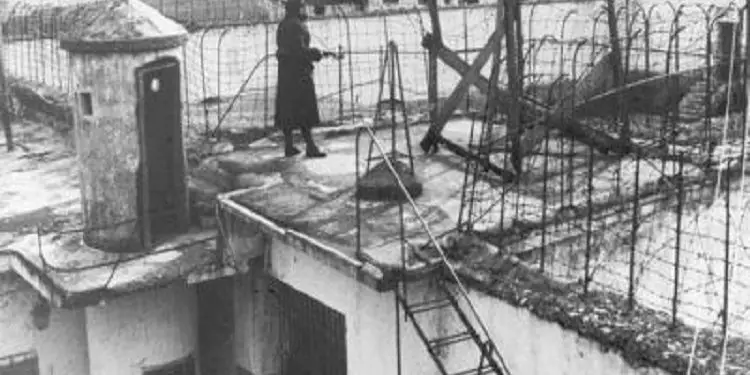
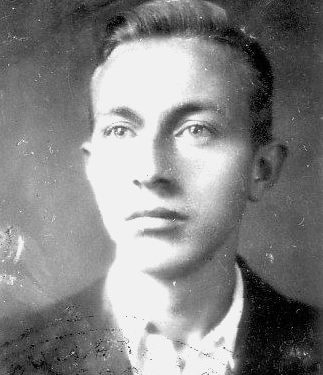
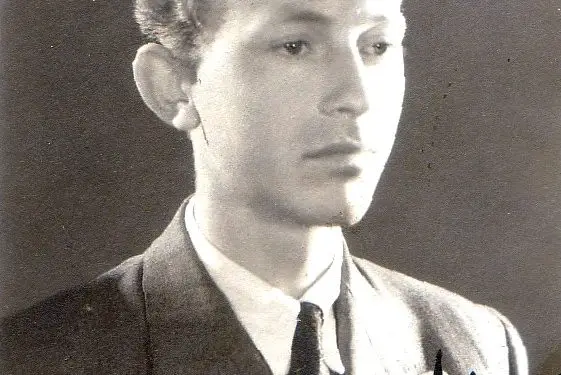
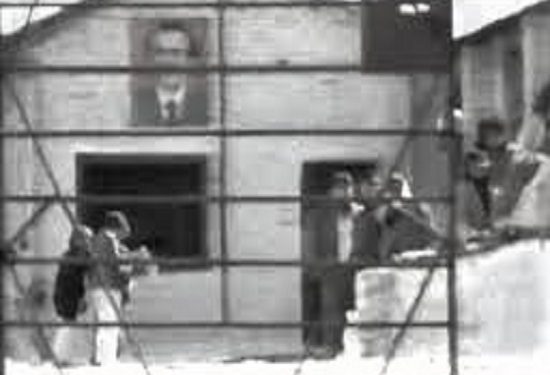
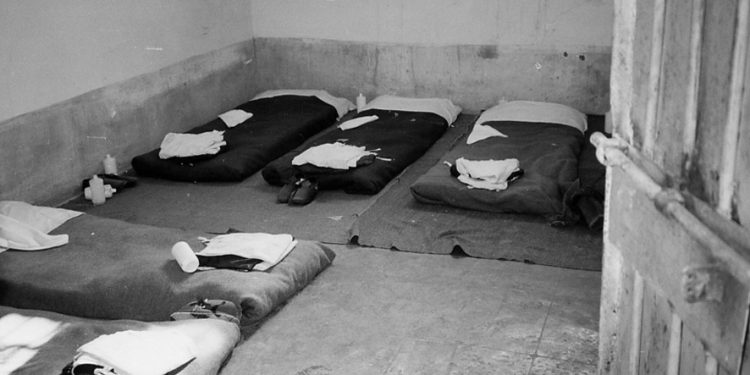
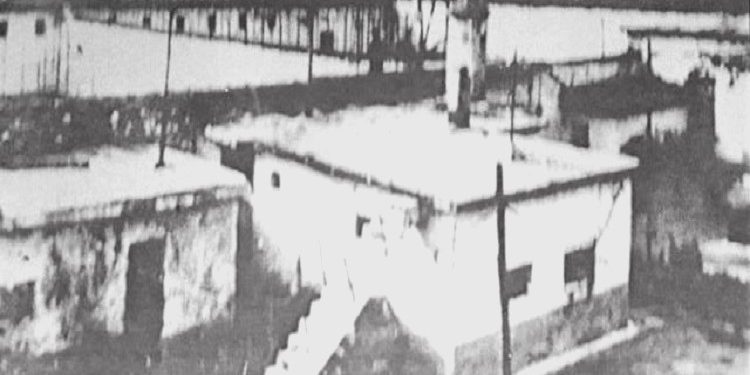
![“The ensemble, led by saxophonist M. Murthi, violinist M. Tare, [with] S. Reka on accordion and piano, [and] saxophonist S. Selmani, were…”/ The unknown history of the “Dajti” orchestra during the communist regime.](https://memorie.al/wp-content/uploads/2026/02/admin-ajax-3-350x250.jpg)
![“In an attempt to rescue one another, 10 workers were poisoned, but besides the brigadier, [another] 6 also died…”/ The secret document of June 11, 1979, is revealed, regarding the deaths of 6 employees at the Metallurgy Plant.](https://memorie.al/wp-content/uploads/2026/02/maxresdefault-350x250.jpg)




